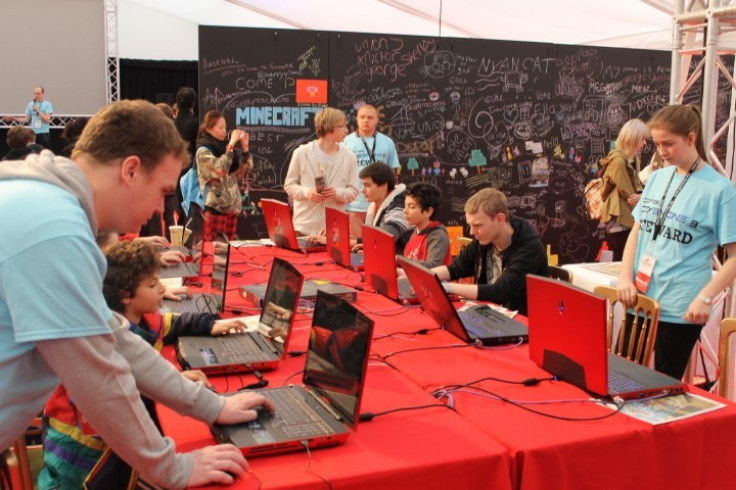E3, Eurogamer and GameCity: The Changing Face of Game Expos
Iain Simons, Rupert Loman and maker of Proteus Ed Key talk about how E3, Eurogamer and GameCity are adapting to suit a broader audience for videogames.

Gaming expos have long been the reserve of fanatical gamers and big marketeers, but as the appeal of videogames starts to broaden, shows like E3 need to change.
Who are computer games for? 15 years ago, you could reasonably point to any bearded young man wearing a Triforce t-shirt and say "him" - but things are different now. With mobiles, Zynga and the proliferation of independent projects, computer games are more accessible and more prevalent than ever before.
The expos built to promote them however remain fenced-off. The biggest, E3, is invite only and generally only attended by specialist press and eager gamers. Go down a notch, and you've shows like PAX and TGS, which although open to the public, enlarge their necks with jargonised ads and esoteric floor shows.
Conventions have been sluggish in catching up to market trends. Games feature on everyday devices; mums and dads are playing them; and mainstream publications like The Guardian and - famously - the Financial Times are covering them. There are the National Videogame Archives and gigs like Wild Rumpus, but the preeminent gaming expos are defiantly closeted. Why?
"Rubbish and damaging"
"It comes, I think, from 20 years of being treated as rubbish and damaging," says Iain Simons, director of Nottingham's GameCity festival. "The industry spent a lot of time, particularly when we started GameCity, being defensive, claiming it was as important as cinema and had to be taken seriously.
"So, games now are really bad at participating in the rest of culture; the game industry makes its cultural journey very hard. It's fuelled by paranoid insecurity, and that drives the industry's inability to have an open conversation."
GameCity provides an optimistic counterpoint. An open-air, free-to-enter festival held across all of Nottingham, it hosts student, independent and analogue games as well as presentations from AAA developers and journalists. A "Welcome" mat compared to E3's closed door, Simons wants GameCity to be an entry point for people unfamiliar with computer games:
"It seemed like there was a vacuum for the game industry to talk to people who weren't just gamers. It's the most important thing. In parts of the gaming industry there's a real sense that you need permission to participate. I think that's retrograde and reductive.

"There's nothing wrong particularly with events like E3, but they don't help with this kind of ghettoization. Games are really bad at participating in the rest of culture."
Trekkie or Crufts?
Big gaming expos have more in common with Trekkie conventions or Crufts - they serve an enthusiast audience rather than a general art crowd. And whereas that might have been fine in the 1990s, back when games were, mainly, a pursuit for teenage boys and nerds, in today's expanding market that niche appeal just doesn't wash.
Big conventions are becoming increasingly irrelevant. If hobbyists want to see the latest games nowadays they can just go on YouTube. If they want to play them then downloadable demos, multiplayer betas and even pre-alpha codes are available online.
The role of expos as a marketing tool is fading, to the point where Nintendo, Valve and Rockstar have all confirmed they won't be at E3 this year. If shows like that are going to survive, they need to broaden their appeal to draw in non-gaming punters.
"It's good to be in a non-insular environment," says Ed Key, game developer and co-creator of Proteus. "It's good to have games exposed to scrutiny, not just to people who are expecting the next realistic military simulator and are going to give it an easy ride - we should be doing more than that. We should be making things that are relative to more people.
"That insular culture has its audience, but I'd like to see it broken down. Things like Wild Rumpus aren't just serving an audience that already exists - they're trying to explore where things fit into overall culture."
Eurogamer
The Eurogamer Expo, held in London each September, is now looking at ways to broaden its appeal. After issuing a ban on booth babes, so long an icon of gamer culture, the expo is now targeting game fans of different ages and tastes: "I wouldn't say it's for absolutely everyone," admits organiser Rupert Loman "but it's for everyone who is enthusiastic about video games, no matter the platform or genre you're interested in."

"The event started out as a small event for the users of our website, Eurogamer.net," he continues "before evolving into a great event for core games. Now I'd say it's moved on again. We're starting to reach a whole new demographic. Last year, the Expo was featured on BBC 1, Radio 1, Radio 5, Sky News and more. It's still quite rare for games to get such mainstream coverage."
"It's good in the sense that you get a lot of people to see your games," says Key, who showed Proteus at Eurogamer 2012. "It's nice to have people play Proteus who wouldn't necessarily go looking for it anywhere else."
"What if games aren't art?"
The role of gaming expos may be shifting, then. Rather than monolithic trade shows that serve consumers who already have their minds made up, a more diverse show floor can turn them into places where gamers or otherwise can discover things. Cut the pomp, cut the jargon - maybe even try and cut back on the cosplay - and get more adults, parents and FT correspondents through the door. As Iain Simons says, there's nothing to be scared of:
"What if by some objective reasoning we reach the decision that games aren't art? So what? It doesn't change anything; it's not about some metric. It's disingenuous for games and the gaming industry to continue talking about becoming part of the mainstream, and then when they are engaged by it to be unable to see that as a positive. If you're serious about being part of mainstream culture, get in the ring."

E3 may be falling out of touch, but in the vein of GameCity, Eurogamer is starting to widen its appeal. Perhaps one day we'll have big gaming expos that are like galleries; until then, even incremental steps are a start.
"Change is already happening," concludes Ed Key. "It seems like a great time for these things."
© Copyright IBTimes 2024. All rights reserved.






